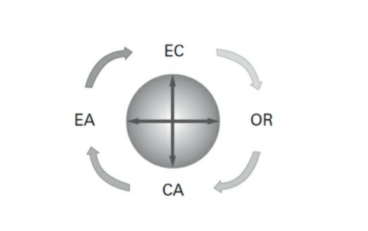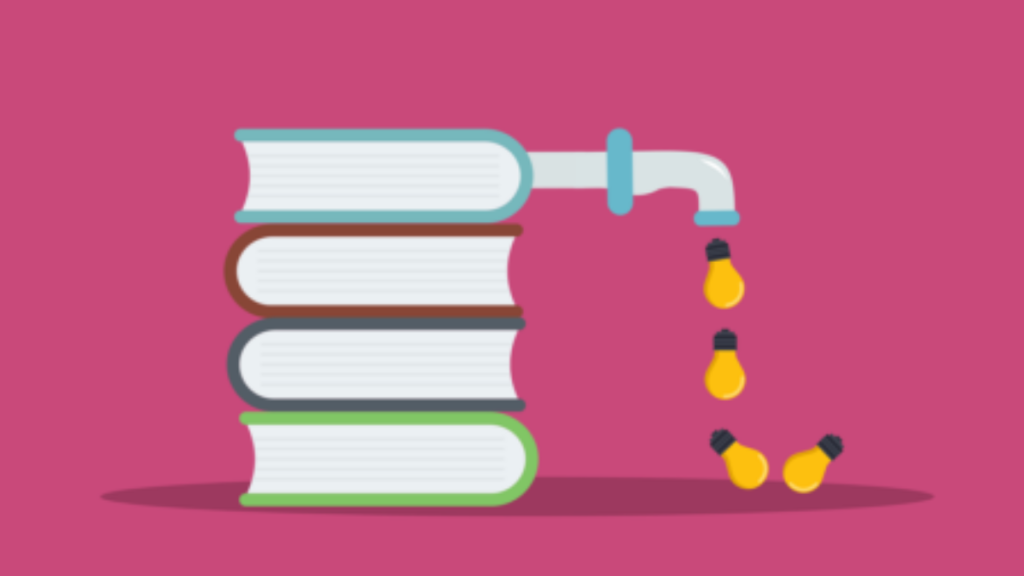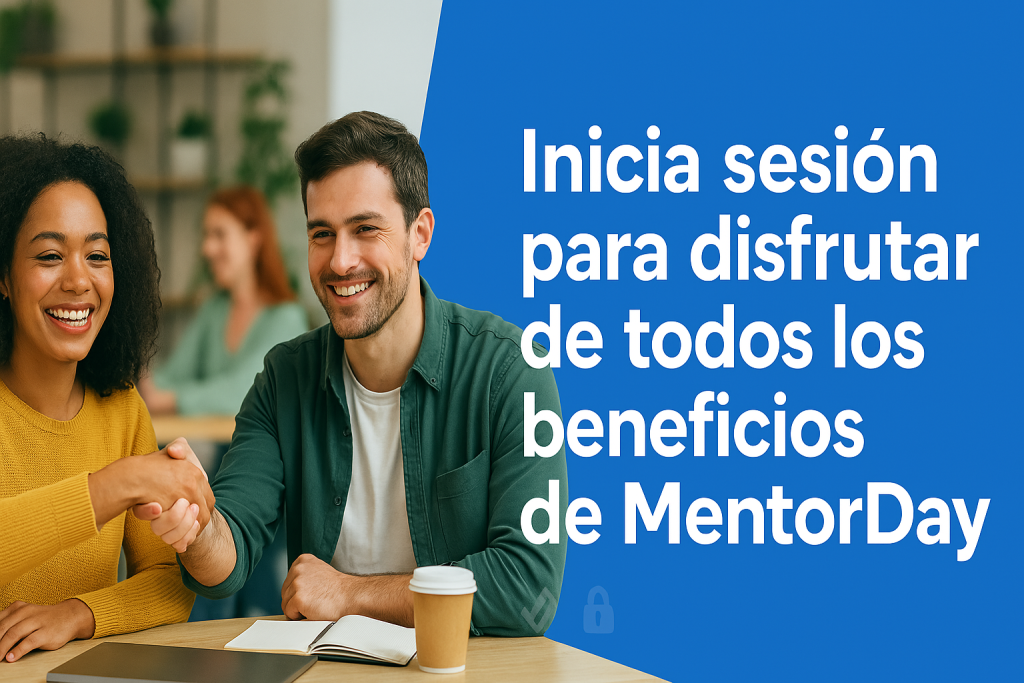APRENDER DE LA EXPERIENCIA
Acelera tu empresa con estos consejos de expertos que cuenta sobre «Aprender de la experiencia». ¡Analiza y descubre esta TIP!
Modelo de aprendizaje, a partir, de la experiencia, ciclo

- EC (Experiencia Concreta): aprender de las relaciones y emociones.
- OR (Observación Reflexiva): aprender observando y escuchando.
- CA (Conceptualización Abstracta): aprender pensando.
- EA (Experimentación Activa): aprender haciendo.
Nos procuramos experiencias vinculadas a nuestras metas, la interpretamos a la luz de las mismas, formamos conceptos abstractos e hipótesis y los ponemos a prueba en situaciones nuevas.
A diferencia del aprendizaje teórico, tradicional en las aulas universitarias con clases magistrales donde el profesor diserta o explica y los alumnos toman notas, se trata de un aprendizaje por descubrimiento, en el que partimos de sumergirnos en la experiencia.
Realmente, es la forma más efectiva de aprender, como hacen los niños, aunque lleva tiempo y, a veces, conlleva riesgos. Cuando un niño toca una bombilla caliente aprende rápidamente que las cosas calientes se queman. Ahora bien, ¡seguramente no le dejaríamos tocar una plancha!
Es importante tener en cuenta que para aprender hay que recorrer todo el camino, todo el ciclo. Una mañana al salir de casa tropezamos con un adoquín y despotricamos contra el alcalde, que es muy aficionado a hacer obras. Al día siguiente, nos vuelve a pasar y pensamos que “los del ayuntamiento no aprenden”.
A eso se le llama “tropezar dos veces con la misma piedra” y, en el ámbito laboral, confundir antigüedad con experiencia.
“No es lo mismo tener 30 años de experiencia que un año de experiencia repetido 30 veces” –
Henry Ford.
Para aprender de las experiencias tendremos que analizarlas, asumir la responsabilidad de nuestras acciones, achacar las consecuencias a nuestros actos, cambiar nuestras convicciones y, finalmente, adoptar nuevos hábitos de comportamiento.
Un mentor asume la responsabilidad de ayudar a su emprendedor a aprender de la experiencia y crea un contexto donde pueda sentirse seguro para experimentar y arriesgarse.
Aprender de la experiencia es un modelo de aprendizaje que se basa en un ciclo compuesto por cuatro etapas:
- Experiencia Concreta (EC)
- Observación Reflexiva (OR)
- Conceptualización Abstracta (CA)
- Experimentación Activa (EA).
Este enfoque permite a los emprendedores adquirir conocimientos y habilidades a partir de la inmersión en situaciones reales, reflexionando sobre ellas, generando conceptos abstractos y poniéndolos a prueba en nuevas situaciones.
LA PRIMERA ETAPA; EXPERIENCIA CONCRETA (EC)
Implica aprender de las relaciones y emociones que surgen de la experiencia directa. Los emprendedores se sumergen en situaciones relacionadas con sus metas y objetivos, interactuando con personas y enfrentando desafíos. A través de esta experiencia, pueden aprender lecciones valiosas y obtener una comprensión más profunda de la realidad empresarial.
LA SEGUNDA ETAPA; OBSERVACIÓN REFLEXIVA (OR)
Se refiere a aprender mediante la observación y la reflexión. Los emprendedores analizan y reflexionan sobre sus experiencias, observando los resultados, las reacciones y las implicaciones de sus acciones. Esta etapa permite una comprensión más profunda de los aspectos involucrados en la experiencia y fomenta la toma de conciencia sobre los propios patrones de pensamiento y comportamiento.
LA TERCERA ETAPA; CONCEPTUALIZACIÓN ABSTRACTA (CA)
Implica aprender a través del pensamiento y la conceptualización. Los emprendedores crean conceptos abstractos y desarrollan hipótesis basadas en su comprensión de las experiencias vividas. En esta etapa, se busca identificar patrones, principios y teorías que puedan ayudar a interpretar y comprender mejor las situaciones empresariales.
LA CUARTA ETAPA; EXPERIMENTACIÓN ACTIVA (EA)
Se centra en aprender a través de la acción y la práctica. Los emprendedores ponen a prueba sus conceptos y hipótesis en situaciones nuevas, aplicando sus conocimientos y habilidades adquiridos. Esta etapa permite la validación de las ideas y el aprendizaje a partir de la retroalimentación y los resultados obtenidos.
Es importante destacar que aprender de la experiencia implica recorrer todo el ciclo de aprendizaje, pasando por cada una de las etapas mencionadas. Solo al completar el ciclo de manera continua y sistemática se logra un aprendizaje efectivo y significativo.
El aprendizaje de la experiencia difiere del aprendizaje teórico tradicional en el sentido de que se enfoca en el descubrimiento y la inmersión en situaciones reales. A través de este enfoque, los emprendedores pueden aprender de manera más profunda y significativa, ya que están directamente involucrados en la práctica y experimentación. Aprenden de los éxitos y fracasos, de los aciertos y errores, y adquieren un conocimiento práctico que puede aplicarse de manera efectiva en su emprendimiento.
Un mentor desempeña un papel fundamental en el aprendizaje de la experiencia para los emprendedores. El mentor asume la responsabilidad de guiar y apoyar al emprendedor en el análisis y la reflexión de sus experiencias. Crea un entorno seguro donde el emprendedor pueda experimentar, arriesgarse y aprender de sus acciones.
EJEMPLO 1
Sofía es una emprendedora que está desarrollando una aplicación móvil para la entrega de comida a domicilio. Durante el proceso de desarrollo, experimenta dificultades técnicas que retrasan el lanzamiento de la aplicación. En lugar de frustrarse, decide aprender de esta experiencia concreta. Reflexiona sobre los obstáculos que ha enfrentado y observa cómo estos obstáculos han afectado su planificación y el cumplimiento de los plazos.
Basándose en esta observación, conceptualiza que es importante contar con un equipo técnico sólido y establecer plazos realistas para evitar retrasos en futuros proyectos. Para poner a prueba sus nuevas ideas, decide contratar a un equipo de desarrollo experimentado y establecer plazos más realistas en su próximo proyecto. A través de esta experimentación activa, aprende a enfrentar y superar obstáculos técnicos y a planificar de manera más efectiva.
EJEMPLO 2
Carlos es un emprendedor que ha lanzado una tienda en línea de productos de belleza. Después de un tiempo en el mercado, observa que muchos clientes abandonan el proceso de compra antes de finalizarlo. En lugar de ignorar esta experiencia, decide aprender de ella. Reflexiona sobre los posibles motivos que podrían estar llevando a los clientes a abandonar la compra y observa detenidamente los patrones de comportamiento de los usuarios en su sitio web.
Conceptualiza que la falta de información clara sobre los productos y los costos de envío podría ser una de las razones principales. Para poner a prueba esta hipótesis, decide implementar mejoras en la presentación de productos, agregar información clara sobre los costos de envío y ofrecer opciones de contacto para resolver dudas. A través de esta experimentación activa, aprende a mejorar la experiencia de compra en su tienda en línea y a reducir la tasa de abandono de carritos de compra.
EJEMPLO 3
Laura es una emprendedora que ha lanzado una empresa de catering para eventos. Después de organizar varios eventos, se da cuenta de que hay momentos de estrés y falta de coordinación durante la ejecución de los servicios. En lugar de pasar por alto esta experiencia, decide aprender de ella. Reflexiona sobre las situaciones que generan estrés y observa cómo la falta de comunicación clara y coordinación puede afectar negativamente la calidad del servicio.
Conceptualiza que la implementación de un sistema de comunicación eficiente y la asignación clara de roles y responsabilidades pueden resolver estos problemas. Para poner a prueba esta hipótesis, decide implementar una plataforma de comunicación interna y establecer reuniones de coordinación previas a cada evento. A través de esta experimentación activa, aprende a mejorar la coordinación y la calidad de los servicios ofrecidos por su empresa de catering.
En estos ejemplos, los emprendedores aprenden de sus experiencias concretas al reflexionar sobre ellas, observar los resultados y las implicaciones, conceptualizar nuevas ideas y ponerlas a prueba en situaciones nuevas.
Mediante este ciclo de aprendizaje, logran adquirir conocimientos y habilidades prácticas que les permiten mejorar y crecer en sus emprendimientos
La inteligencia artificial (ver+ TIP) puede ayudar a aprender de la experiencia al proporcionar información y perspectivas relevantes basadas en su amplio conocimiento y experiencia acumulada. Al interactuar con la inteligencia artificial, los usuarios pueden plantear preguntas, compartir experiencias y recibir respuestas detalladas y contextualizadas.
A través de su capacidad de procesar grandes cantidades de información y analizar diversos puntos de vista, la inteligencia artificial puede ayudar a los emprendedores a reflexionar sobre sus experiencias pasadas y presentar diferentes enfoques para enfrentar desafíos o situaciones similares en el futuro.
Además, la inteligencia artificial puede proporcionar ejemplos prácticos, casos de estudio y consejos basados en situaciones similares a las que el emprendedor ha enfrentado. Esto permite al emprendedor aprender de las experiencias de otros y aplicar ese conocimiento en su propio contexto.
Otra forma en que la inteligencia artificial puede ayudar a aprender de la experiencia es al actuar como un recurso de referencia en tiempo real. Los emprendedores pueden consultar a la inteligencia artificial para obtener información actualizada sobre tendencias, mejores prácticas, investigaciones relevantes y recomendaciones específicas basadas en su experiencia previa y las lecciones aprendidas.
Además, la inteligencia artificial puede proporcionar retroalimentación constructiva y sugerencias para mejorar en función de los datos y la información proporcionados. Esto permite a los emprendedores reflexionar sobre sus acciones pasadas y recibir orientación sobre cómo mejorar en el futuro.
IMPORTANTE DESTACAR:
Si bien la inteligencia artificial es una valiosa herramienta de aprendizaje, su conocimiento se basa en datos y patrones previos, y no reemplaza la experiencia humana y el juicio personal. Por lo tanto, es recomendable combinar el aprendizaje de la experiencia a través de la interacción con la inteligencia artificial con otras fuentes de información, la retroalimentación de mentores y expertos, y la propia reflexión y evaluación personal.
APLICA ESTE TIP EN TU PROYECTO
CASO PRÁCTICO
Nombre: Ana García
Perfil de emprendedora: Ana es una joven emprendedora que ha lanzado recientemente una startup de entrega de comidas saludables a domicilio. Está participando en un programa de aceleración que brinda apoyo y mentoría a emprendedores.
Durante el programa de aceleración, Ana ha tenido la oportunidad de aprender de la experiencia a medida que su negocio se ha desarrollado.
A CONTINUACIÓN, SE DESCRIBE SU EXPERIENCIA Y CÓMO HA APRENDIDO DE ELLA:
EXPERIENCIA CONCRETA
Ana ha estado operando su negocio de entrega de comidas saludables durante tres meses. Durante este tiempo, ha enfrentado varios desafíos, como problemas logísticos, dificultades para encontrar proveedores confiables y la necesidad de ajustar su modelo de negocio para satisfacer las demandas de los clientes.
REFLEXIÓN
Ana se toma el tiempo para reflexionar sobre cada situación y analizar los resultados. Por ejemplo, cuando tuvo problemas logísticos que resultaron en entregas tardías, reflexionó sobre las causas y cómo podría mejorar el proceso de entrega. También reflexionó sobre la calidad de los proveedores con los que trabajaba y si necesitaba realizar cambios en su cadena de suministro.
OBSERVACIÓN
Ana también aprovecha la oportunidad para observar y aprender de otros emprendedores en el programa de aceleración. Participa activamente en las sesiones grupales donde comparten sus experiencias y desafíos. Escucha las historias de éxito y fracaso de otros emprendedores y toma notas de los consejos y estrategias que pueden ser aplicables a su negocio.
CONCEPTUALIZACIÓN ABSTRACTA
Con base en sus experiencias y observaciones, Ana desarrolla conceptos abstractos y nuevas ideas para mejorar su negocio. Por ejemplo, después de reflexionar sobre los problemas logísticos, conceptualiza un nuevo sistema de rastreo en línea para que los clientes puedan realizar un seguimiento en tiempo real de sus pedidos. También conceptualiza la idea de establecer relaciones estratégicas con proveedores locales para garantizar la calidad y la entrega oportuna de los ingredientes.
EXPERIMENTACIÓN ACTIVA
Ana pone en práctica sus ideas y conceptos mediante la experimentación activa. Implementa el sistema de rastreo en línea y realiza pruebas piloto con nuevos proveedores locales. A medida que experimenta, evalúa los resultados y realiza ajustes según sea necesario. Por ejemplo, si encuentra que un proveedor no cumple con sus estándares de calidad, realiza cambios y busca alternativas.
APRENDIZAJE DE LA EXPERIENCIA
A medida que Ana avanza en su negocio, aprende valiosas lecciones de sus experiencias. Ha aprendido a tomar decisiones más informadas y estratégicas al observar y aprender de otros emprendedores en el programa de aceleración. También ha aprendido a reflexionar sobre los desafíos y a encontrar soluciones creativas mediante la conceptualización abstracta. La experimentación activa le ha permitido probar nuevas ideas y adaptarse a medida que aprende de los resultados.
En resumen, Ana ha aprendido de la experiencia a lo largo de su participación en el programa de aceleración. Ha utilizado el modelo de aprendizaje basado en la experiencia para reflexionar, observar, conceptualizar y experimentar activamente. A través de este proceso, ha adquirido conocimientos y habilidades que le han permitido superar desafíos y tomar decisiones.
- 💻 PRACTICA con un experto en el próximo webinar práctico.
- 🔎 CONSULTA más TIPs relacionadas con este mismo tema.
- 📖 AMPLIA tus conocimientos descargando este EBOOK.
PIENSA EN TI
- 🚀 IMPULSA tu empresa en el próximo programa de aceleración, ¡reserva tu plaza ya!
- 🥁 PRACTICA con tu proyecto en este webinar práctico, ¡solicita tu plaza!.
- 🌐 CONTACTA con otros emprendedores y empresas, ¡inscríbete y participa en el próximo Networking!
PIENSA EN AYUDAR A LOS DEMÁS
- 🤝COLABORA como voluntario: experto, mentor, inversor, premiando, difundiendo, retando, innovando, creando una TIP…
- 💬 RECOMIENDA este programa para que llegue a más emprendedores por Google.
- 👉 ¡COMPARTE tu aprendizaje!
- 📲 REENVÍA esta TIP 👇








